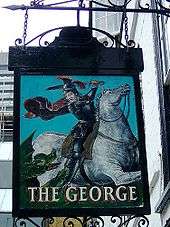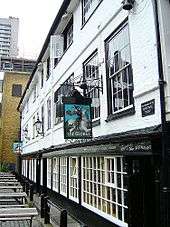The George Inn, Southwark
| The George Inn | |
|---|---|
 | |
| Former names |
|
| Alternative names | The George |
| General information | |
| Type | Public house |
| Address |
Borough High Street London, SE1 United Kingdom |
| Coordinates | 51°30′15″N 0°05′24″W / 51.504182°N 0.090021°WCoordinates: 51°30′15″N 0°05′24″W / 51.504182°N 0.090021°W |
| Current tenants | Tenanted by brewery |
| Owner | National Trust |
| Website | |
The George, or George Inn, is a public house established in the medieval period on Borough High Street in Southwark, London. Currently owned and leased by the National Trust, it is located about 250 m from the south side of the River Thames near London Bridge. It is the only surviving galleried London coaching inn.[1] The first map of Southwark (Duchy of Lancaster ca1543) clearly shows it marked as 'Gorge'. It was formerly known as the George and Dragon, named after the legend of Saint George and the Dragon. It is by far the oldest pub in London.
History
In 1677 the George was rebuilt after a serious fire that destroyed most of medieval Southwark.[2] There had been many such inns in this part of London. Probably the most famous was The Tabard where, in 1388, Chaucer began The Canterbury Tales. The Tabard was also rebuilt after the same fire, but was demolished in the late nineteenth century.
Later, the Great Northern Railway used the George as a depot and pulled down two of its fronts to build warehousing. Now just the south face remains.
The George was one of the many famous coaching inns in the days of Charles Dickens. Dickens in fact visited the George and referred to it in Little Dorrit. It is thought that the galleried inns were the inspiration of the original theatres, that the Players were on a dais in the courtyard with the standing audience next to them and that those paying a premium would be in the galleries with a better view.
Description
The ground floor of the inn is divided into a number of connected bars. The Parliament Bar used to be a waiting room for passengers on coaches. The Middle Bar was the Coffee Room, which was frequented by Charles Dickens. The bedrooms, now a restaurant, were upstairs in the galleried part of the building.
It is one of only two coaching inns to survive in Greater London, and is the only galleried example. The White Hart is immediately to the north, and the site of The Tabard immediately to the south (now Talbot Yard). The building is Grade I listed, and is listed in CAMRA's National Inventory of Historic Pub Interiors.[3]
Literature
The beer writer Pete Brown explores the history of the pub in his book Shakespeare's Local and provides a lot of information about the pub and the surrounding area.
Gallery
-

The sign depicts Saint George slaying a dragon.
-

Secondary sign, with another depiction of Saint George slaying the dragon.
-

-

Inn, 1858
-
.jpg)
Inn, 1889
-
.jpg)
rear of Inn and coach yard, 1889
-
.jpg)
tap room
-
.jpg)
coffee-room
-
.jpg)
first floor gallery
-
.jpg)
bar parlour
-
.jpg)
dining room
References
- ↑ The George Inn, SE1
- ↑ http://www.hudson.org/index.cfm?fuseaction=publication_details&id=9610
- ↑ Brandwood & Jephcote, Geoff & Jane (July 2008). London Heritage Pubs – An Inside Story. CAMRA (Campaign For Real Ale) Books. ISBN 978-1-85249-247-2.
Further reading
- Matz, Bertram Waldrom (1918). The George Inn, Southwark. London: Chapman and Hall.
External links
| Wikimedia Commons has media related to The George Inn, Southwark. |